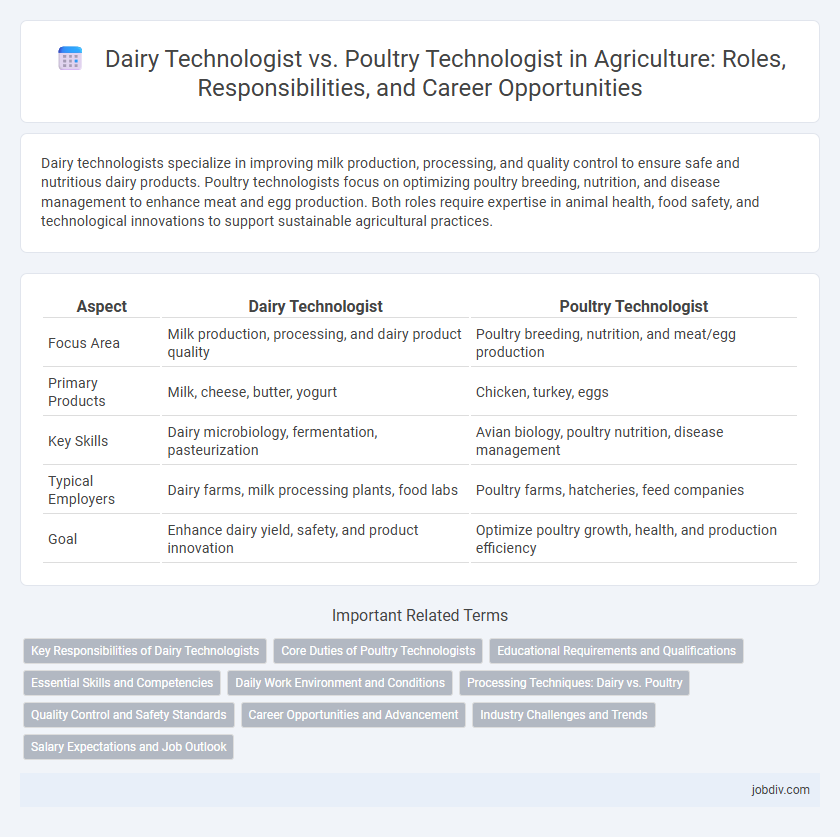Dairy technologists specialize in improving milk production, processing, and quality control to ensure safe and nutritious dairy products. Poultry technologists focus on optimizing poultry breeding, nutrition, and disease management to enhance meat and egg production. Both roles require expertise in animal health, food safety, and technological innovations to support sustainable agricultural practices.
Table of Comparison
| Aspect | Dairy Technologist | Poultry Technologist |
|---|---|---|
| Focus Area | Milk production, processing, and dairy product quality | Poultry breeding, nutrition, and meat/egg production |
| Primary Products | Milk, cheese, butter, yogurt | Chicken, turkey, eggs |
| Key Skills | Dairy microbiology, fermentation, pasteurization | Avian biology, poultry nutrition, disease management |
| Typical Employers | Dairy farms, milk processing plants, food labs | Poultry farms, hatcheries, feed companies |
| Goal | Enhance dairy yield, safety, and product innovation | Optimize poultry growth, health, and production efficiency |
Key Responsibilities of Dairy Technologists
Dairy Technologists specialize in overseeing milk production, ensuring quality control, pasteurization, and processing of dairy products like cheese, butter, and yogurt. They conduct microbial testing, monitor storage conditions, and develop new dairy products to meet health and safety standards. Their key responsibilities also include managing equipment maintenance and complying with regulatory guidelines set by food safety authorities.
Core Duties of Poultry Technologists
Poultry Technologists specialize in overseeing the breeding, nutrition, health management, and disease control of poultry flocks to maximize productivity and ensure food safety. Their core duties include developing feed formulations, implementing biosecurity measures, monitoring flock performance, and advancing hatchery techniques to optimize egg and meat production. Unlike Dairy Technologists who focus on milk production and dairy product processing, Poultry Technologists are dedicated to enhancing poultry farm operations through scientific and technological innovations.
Educational Requirements and Qualifications
Dairy Technologists typically require a bachelor's degree in Dairy Technology, Food Science, or Agricultural Engineering, with specialized training in milk processing, quality control, and dairy product development. Poultry Technologists often hold a degree in Poultry Science, Animal Science, or Agricultural Biology, focusing on poultry nutrition, breeding, and disease management. Both fields demand knowledge of food safety standards, laboratory skills, and industry regulations, but the specific curriculum and practical experiences differ according to the livestock or product specialization.
Essential Skills and Competencies
Dairy Technologists require expertise in milk processing, quality control, and fermentation techniques, emphasizing skills in microbiology and food safety regulations. Poultry Technologists focus on poultry breeding, nutrition, and disease management, requiring competencies in animal husbandry and biosecurity practices. Both roles demand proficiency in laboratory analysis, data interpretation, and adherence to industry standards for product quality and safety.
Daily Work Environment and Conditions
Dairy Technologists typically work in controlled environments such as milk processing plants and laboratories, managing tasks related to milk quality testing, product formulation, and hygiene monitoring under strict sanitary conditions. Poultry Technologists operate in more variable settings, including poultry farms and hatcheries, where they oversee bird health, nutrition, and housing conditions, often dealing with outdoor exposure and fluctuating temperatures. Both professions require adherence to safety protocols but differ significantly in daily environmental factors, with dairy roles leaning towards sterile, indoor settings and poultry roles involving more fieldwork and animal interaction.
Processing Techniques: Dairy vs. Poultry
Dairy technologists specialize in processing techniques such as pasteurization, homogenization, and fermentation to enhance milk products' safety, shelf life, and quality. Poultry technologists focus on techniques like chilling, freezing, marinating, and controlled atmosphere packaging to maintain poultry meat freshness and prevent spoilage. Both fields require precise temperature and hygiene control, but dairy processing emphasizes bacterial cultures, while poultry processing prioritizes pathogen reduction and texture preservation.
Quality Control and Safety Standards
Dairy technologists implement stringent quality control protocols to ensure milk and dairy products meet safety standards, focusing on microbial contamination, pasteurization, and shelf-life stability. Poultry technologists emphasize pathogen detection and management in poultry meat and eggs, prioritizing biosecurity measures and antibiotic residue monitoring to guarantee product safety. Both specialists employ advanced testing methods to comply with regulatory requirements and protect consumer health.
Career Opportunities and Advancement
Dairy technologists specialize in milk processing, quality control, and dairy product development, offering career advancement in dairy manufacturing plants, quality assurance labs, and food safety regulatory bodies. Poultry technologists focus on breeding, nutrition, and disease management of poultry, with growth opportunities in poultry farms, feed companies, and veterinary services. Both fields provide roles in research and development, but dairy technologists often advance into roles emphasizing product innovation, while poultry technologists increasingly pursue careers in genetic improvement and biosecurity management.
Industry Challenges and Trends
Dairy technologists face challenges such as ensuring milk safety, improving processing efficiency, and adapting to consumer demand for organic and plant-based alternatives. Poultry technologists contend with disease control, optimizing feed conversion ratios, and meeting the rising demand for antibiotic-free and ethically sourced poultry products. Both sectors must integrate advanced technologies like automation and blockchain for traceability to address sustainability and regulatory compliance issues.
Salary Expectations and Job Outlook
Dairy Technologists typically earn a median annual salary of $55,000 to $70,000, driven by demand in milk production and processing sectors, while Poultry Technologists often see salaries ranging from $50,000 to $65,000 due to the growing poultry industry's expansion. Job outlooks for Dairy Technologists highlight steady growth tied to innovations in dairy product development and quality control, whereas Poultry Technologists benefit from rising poultry consumption and advancements in disease control and breeding technologies. Both fields offer strong career prospects but differ in specialization focus and regional industry demand influencing salary variations.
Dairy Technologist vs Poultry Technologist Infographic

 jobdiv.com
jobdiv.com